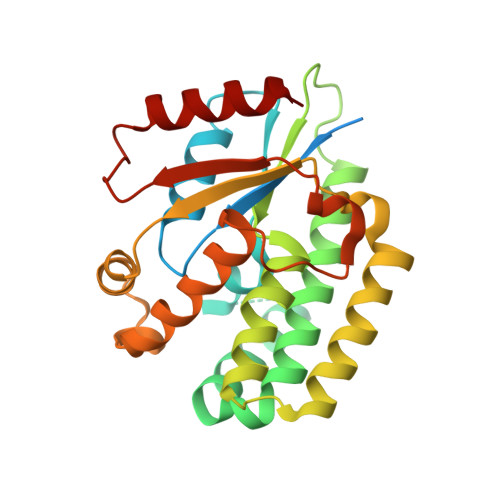Structure-guided development of deoxycytidine kinase inhibitors with nanomolar affinity and improved metabolic stability.
Nomme, J., Li, Z., Gipson, R.M., Wang, J., Armijo, A.L., Le, T., Poddar, S., Smith, T., Santarsiero, B.D., Nguyen, H.A., Czernin, J., Alexandrova, A.N., Jung, M.E., Radu, C.G., Lavie, A.(2014) J Med Chem 57: 9480-9494
- PubMed: 25341194
- DOI: https://doi.org/10.1021/jm501124j
- Primary Citation of Related Structures:
4Q18, 4Q19, 4Q1A, 4Q1B, 4Q1C, 4Q1D, 4Q1E, 4Q1F - PubMed Abstract:
Recently, we have shown that small molecule dCK inhibitors in combination with pharmacological perturbations of de novo dNTP biosynthetic pathways could eliminate acute lymphoblastic leukemia cells in animal models. However, our previous lead compound had a short half-life in vivo. Therefore, we set out to develop dCK inhibitors with favorable pharmacokinetic properties. We delineated the sites of the inhibitor for modification, guided by crystal structures of dCK in complex with the lead compound and with derivatives. Crystal structure of the complex between dCK and the racemic mixture of our new lead compound indicated that the R-isomer is responsible for kinase inhibition. This was corroborated by kinetic analysis of the purified enantiomers, which showed that the R-isomer has >60-fold higher affinity than the S-isomer for dCK. This new lead compound has significantly improved metabolic stability, making it a prime candidate for dCK-inhibitor based therapies against hematological malignancies and, potentially, other cancers.
- Department of Biochemistry and Molecular Genetics, and ‡Center for Pharmaceutical Biotechnology, University of Illinois at Chicago , Chicago, Illinois 60607, United States.
Organizational Affiliation:


















